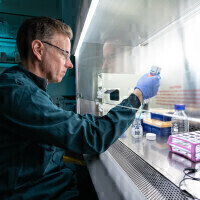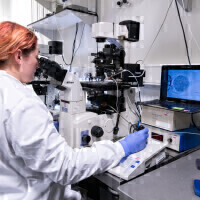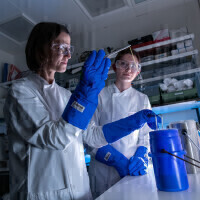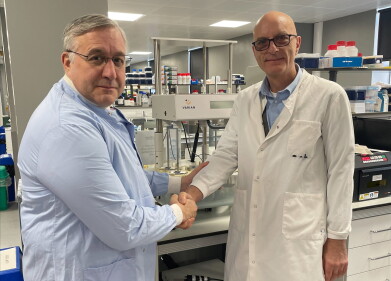News
The Crick Exhibition explores the Future and Ethics of Genome Editing
May 05 2023
The Francis Crick Institute is currently hosting the UK’s first exhibition dedicated to exploring public attitudes towards genome editing, which involves scientists making changes to DNA for better understanding of the role of different genes. DNA editing has already been proved as a useful tool, for example, it has led to new treatments for certain conditions and the creation of disease-resistant crops.
Recently new genome editing technologies have been developed which allow scientists to alter DNA more quickly, easily and accurately, hold vast potential to improve human health and the world around us - but they also come with all sorts of ethical questions.
Cut + Paste explores the ethical issues surrounding genome editing and its potential applications, inviting visitors to reflect on questions including:
- Should genome editing be used to avoid or treat 'severe' conditions? If so, who gets to decide which conditions are ‘severe’?
- If genome editing in plants or animals could help to reduce hunger, malnutrition or climate change, would you support it?
- Should genome editing be used to create human 'enhancements'? How can 'enhancement' be defined?
- Genome editing has the power to shape the future. Whose vision of the future should it be?
Through a series of hands-on activities created by studio partner The Liminal Space, visitors to one of Europe’s largest biomedical research institutes will be given a glimpse of future science and society, and will be encouraged to share their thoughts and reflect on how scientific tools might be used in different scenarios, today and in years to come.
The free exhibition is taking place within sight of laboratories where researchers are already using genome editing technologies every day to study health and disease, including fertility, brain development, cancer, tuberculosis, malaria, COVID-19, and many more topics.
Robin Lovell-Badge, principal group leader at the Crick and international expert on genome editing said: “As technology and science progresses, things that were previously impossible or in the realm of science-fiction, are now reality. But important questions remain about how comfortable we are as a society for genome editing to be used and where the line should be drawn. These questions are not just for scientists to answer, as the decisions will impact all of us.”
Ruth Garde, creative producer for Cut + Paste, said: “Genome editing will be a new and unfamiliar topic for a lot of people. Cut + Paste offers a really engaging and approachable opportunity to explore it, which is so important - not only because of the ethical dilemmas it raises about how to tackle current and future health challenges, but also because it asks questions about what it means to be human in a time of advancing scientific technologies.”
Sarah Douglas, director of The Liminal Space, added: “As a purpose-led creative studio, The Liminal Space uses art and design to create experiences that confront some of the most important social issues of our time. Genome editing is a perfect example of this: it has the possibility to transform lives for the better, but also holds important ethical questions for public consideration. We have worked rigorously with scientists from the Crick to develop an exhibition that is imaginative and exciting, and also invites visitors to participate in a critical conversation that’s taking place in science right now.”
Cut + Paste, which runs until December, provides access resources such as large print, Braille and Easy-Read books; British sign-language and Audio Described tours will be available.
An online experience is also available on the Crick’s website, for people who prefer to reflect on the topics explored in the exhibition remotely or people unable to travel to central London.
Katie Gonzalez-Bell, accessibility consultant for Cut + Paste, explained: “It’s so important to open a dialogue exploring the complex and challenging nature of the ethics of genome editing. And to recognise that for many living with conditions or disabilities, the concept of genome editing has personal and profound implications. Cut + Paste aims to provide an inclusive environment to reflect on this topic, with space to ask questions and share opinions.”
All pictures Credit of: The Francis Crick Institute
More information online
Digital Edition
ILM 50.2 March 2025
March 2025
Chromatography Articles - Effects of small deviations in flow rate on GPC/SEC results Mass Spectrometry & Spectroscopy Articles - Waiting for the present to catch up to the future: A bette...
View all digital editions
Events
Mar 20 2025 Brussels, Belgium
Mar 20 2025 Chandigarh, India
ACS National Meeting & Expo, Spring 2025
Mar 23 2025 San Diego, CA, USA
Mar 25 2025 Paris, France
Mar 27 2025 New Delhi, India






.jpg)








.jpg)























